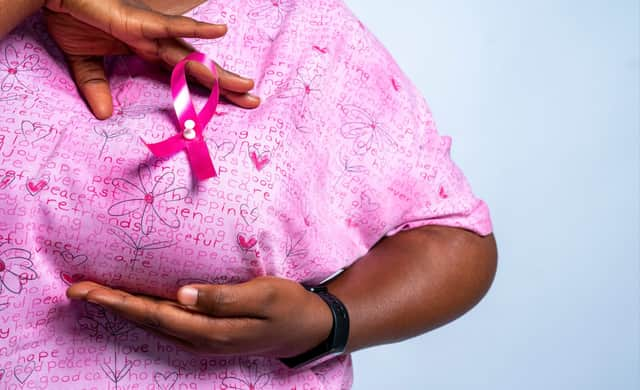An existing drug could be used to treat ‘aggressive’ forms of breast cancer - new research explained


A cancer drug that has already been approved could be used to treat more aggressive forms of breast cancer, new research has found.
In a study funded by Breast Cancer Now, researchers have identified a specific defect in some triple-negative breast cancers which a pre-existing drug could help to treat.
‘Hugely exciting’
Advertisement
Hide AdAdvertisement
Hide AdLed by Dr Rachael Natrajan at The Institute of Cancer Research, the research discovered a way to identify triple-negative breast tumours that could be more likely to respond to a class of drugs called CDK4/6 inhibitors, including palbociclib.
Palbociclib is currently used to treat other breast cancers that have spread to a different part of the body.
However, this new study has found there is potential to use the drug to treat around a fifth of people living with triple-negative breast cancer.
While it will take several years to carry out clinical trials to prove the effectiveness, if these are successful, CDK4/6 inhibitors could be given as treatment within five years.
Advertisement
Hide AdAdvertisement
Hide AdDr Simon Vincent, director of research, support and influencing at Breast Cancer Now, hailed the discovery as “hugely exciting”.
He said: “Each year, around 8,000 UK women are diagnosed with this aggressive form of breast cancer and we desperately need new, effective ways to treat them and stop them dying from this devastating disease.
“We hope that if clinical trials confirm that palbociclib is beneficial for some of these women, it will be advanced through the approval process and made available for those who need it as quickly as possible.”
What is triple-negative breast cancer?
Triple-negative breast cancer refers to a group of cancers that lack the three molecules which are normally used to classify the disease - the oestrogen receptor (ER), progesterone receptor (PR), and human epidermal growth factor receptor 2 (HER2) protein.
Advertisement
Hide AdAdvertisement
Hide AdThis type of cancer, which disproportionately affects younger women and black women, is often resistant to traditional chemotherapy and is more likely to spread sooner, becoming incurable.
Instead, triple-negative breast cancer is treated with a combination of surgery, chemotherapy and radiotherapy.
During the study, the research team screened 200 of the most frequently altered genes in breast cancer to investigate how changes in these can affect a cancer’s ability to grow.
Researchers then used ‘mini-tumours’ grown in the lab and found that some triple-negative breast cancer cells cause a decrease in levels of the CREBBP protein.
Advertisement
Hide AdAdvertisement
Hide AdLow levels of this protein are linked to poorer survival rates in patients with triple-negative breast cancer because the cells can grow faster and more aggressively.
However, when the levels of this protein are low, tumour cells multiply by relying on CDK4 and CDK6 proteins, but these can then be blocked with CDK4/6 inhibitors, such as palbociclib, which stops the cancer cells from growing.
The researchers tested the effectiveness of the drug on cancer cells with CREBBP alterations in the lab and in mice. The drug was found to be effective even when tested on standard chemotherapy-resistant triple-negative breast cancer cells that lacked CREBBP, donated by a patient.
Speaking about the results, Dr Natrajan said: “Our study shows what drives the growth of some triple-negative breast cancers and suggests the exciting possibility that an already-approved breast cancer drug could be used to help women with this type of disease.”